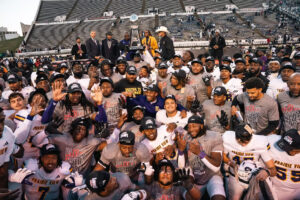Last November was supposed to be the first time Chicago polling places were fully compliant with the Americans with Disabilities Act.
Instead, as voters cast their ballots in city elections through Tuesday, just over a third of the polling places — often schools, park district facilities, libraries or churches — are fully accessible by ADA standards.
Advertisement
Some say the city has made promising improvements since the U.S. Department of Justice first flagged accessibility problems at polling places in Chicago and in other big cities in 2016. But activists contend Chicago has more to do before all people with disabilities can fully access their right to vote privately and independently.
Of 933 polling places, 36% are considered by the Chicago Board of Elections to be “high accessibility,” or fully ADA compliant, for those with mobility impairments, like those who use wheelchairs, walkers, crutches or scooters. That evaluation is based on whether entrances have steps, the slope of ramps, the width of doorways and other potential obstacles.
Advertisement
Twenty percent have “medium” accessibility, meaning they don’t have steps, but may have an entrance just shy of the ADA-minimum width or a slope corridor that’s too steep for some. The rest have “unknown” conditions or are deemed “low” or “no” accessibility because they have a step, excessive slopes or doorways too narrow.
Those ratings don’t include whether parking, passenger dropoffs or restrooms are accessible. Nor do they include an assessment of architectural barriers for people who are blind or low-vision.
In 2017, the elections board entered into a settlement with the Department of Justice to make all polling places accessible, but the board has moved its deadline for full compliance on multiple occasions. As a condition of that settlement, the board originally aimed to make all polling places compliant by November 2018. When that passed, the goalpost moved to the November 2022 general election.
By then, less than 10% of polling places were fully ADA-compliant, which board spokesman Max Bever conceded might be a “distressing” number for those with disabilities to see. It was a drop from the June primary election, when about 1 in 5 polling places were fully compliant. The decline contradicted commissioners’ earlier promises that their rapid consolidation of precincts between the 2022 primary and general election would allow them to focus on securing more accessible locations.
In December, the deadline was formally pushed back again to November 2024. Bever said COVID-19 limited in-person location checks, and there were also fewer faciltiies willing to serve as polling places. Senior homes, for example, are typically fully accessible, but some operators did not want to take the risk that voters could potentially infect residents.
In the meantime, the board has rolled out a new rating system to give mobility-impaired voters more information about their assigned polling place and about early or mail-in voting options. All early voting sites are fully ADA compliant and have touch screens for the vision impaired or those who need a ballot in a different language. They’re also equipped with hand-held controllers and other accessibility tools. Early voting sites are open on Election Day to all voters, no matter where they live.
A key player in the push for full accessibility is Equip for Equality, an Illinois disability advocacy group, which was hired by the city to monitor its progress, as stipulated in the original agreement with the Justice Department. The nonprofit conducts surveys of all polling places to provide detailed information on what needs to be updated in order to achieve ADA compliance.
Equip for Equality’s senior attorney of voting rights, Bebe Novich, a former ADA prosecutor and director of ADA policy for Chicago Public Schools, said the board has made “tremendous” progress and believes it is likely to reach its target by the 2024 deadline.
Advertisement
The elections board, the DOJ and Equip for Equality “have been working very well together for several years to try to get all the information we need and to try to make things more accessible or relocate,” Novich said, noting that willingness to make permanent accessibility renovations is typically hard to come by. Sister agencies like CPS; the Chicago Park District; and the city Department of Transportation, which has been fixing sidewalks, have all stepped up to make permanent accessibility upgrades at their buildings, she and Bever said.
They both acknowledge, however, that ADA compliance standards are mainly about access by people with wheelchairs, walkers, scooters or crutches. Voting privately and independently takes a lot more than mobility accessibility, advocates say.
“There are lots of other disabilities that don’t factor that much into these architectural standards,” said Novich.
Vote-by-mail has made the process more accessible overall, said Amber Smock, director of advocacy at Access Living. Filling out a ballot at home allows people more time and space to go over it and saves them a trip to the polling place, she said.
Illinois recently updated state laws to make vote-by-mail applications more accessible to those with visual impairments, thanks to an electronic application that’s compatible with screen readers, Bever said.
But Patti Chang, director of outreach for the National Federation of the Blind, said that the lack of electronic balloting from home undermines the ability of the blind community to complete the ballot privately and independently. Not all voters have access to a printer, and ballots must have a signature that must be found visually. Both are barriers, said Chang.
Advertisement
Audio ballot machines at polling places, which a voter uses with their own or supplied headphones, can allow them to complete a ballot privately and independently.
“The first time I went in and was able to exercise my right to a secret ballot, I cried,” Chang said. “I went to the polling place. I was given an audible ballot. For the first time ever, I didn’t have to tell two people or my spouse exactly how I was voting. I mean, that is a powerful right in this country.”
But while touch screen voting is available at every polling place, Chang and Smock said it isn’t always usable for disabled voters. Chang said workers sometimes don’t treat disabled people respectfully, including not talking “to us directly.”
And Novich admitted that sometimes the audio ballot is not set up properly on election day.
“It always also comes … down to whether or not the staff were trained and ready to go,” Smock said. “You could have a very physically accessible polling place, and then the staff have no idea how to engage with people with disabilities and support their request.”
Bever said poll workers are instructed on how to operate an audio ballot and was optimistic that the return of in-person training will make for a smoother experience for voters who seek that option.
Advertisement
While the city works toward 100% compliance, the new tiered description of accessibility will be a “stopgap” to provide “more publicly available information for people to assess before election day and to plan accordingly,” Bever said.
The new ratings system offers more nuance, given the ADA standards used in the settlement agreement can be incredibly strict. For example, Novich said, a polling place could be perfectly compliant, but a height difference between two sidewalk panels would make it inaccessible under the board’s old binary system.
“We’ve got a lot of work to do over the next year and a half. Ultimately, the Chicago Board of Elections may start having to make hard decisions on traditional polling places that have not gotten up to full ADA compliance,” Bever said, adding the board can’t fund accessibility construction.
“The solution here isn’t just cutting inaccessible polling places entirely, either,” he said. Doing so wouldn’t “serve all voters of the city. … It is important work, but we’re balancing it with the availability of polling places.”
If you have a question about polling place accessibility, or have a problem at your polling place, contact the Chicago Board of Elections at 312-269-7976 or cboe@chicagoelections.gov. If you have accessibility issues on Election Day Tuesday, you can also contact Equip for Equality’s help line at 800-537-2632.
Advertisement







